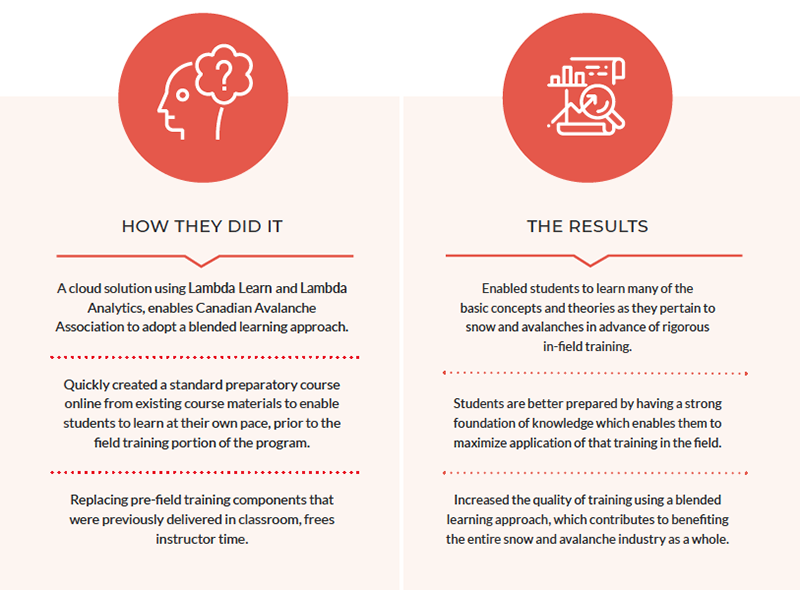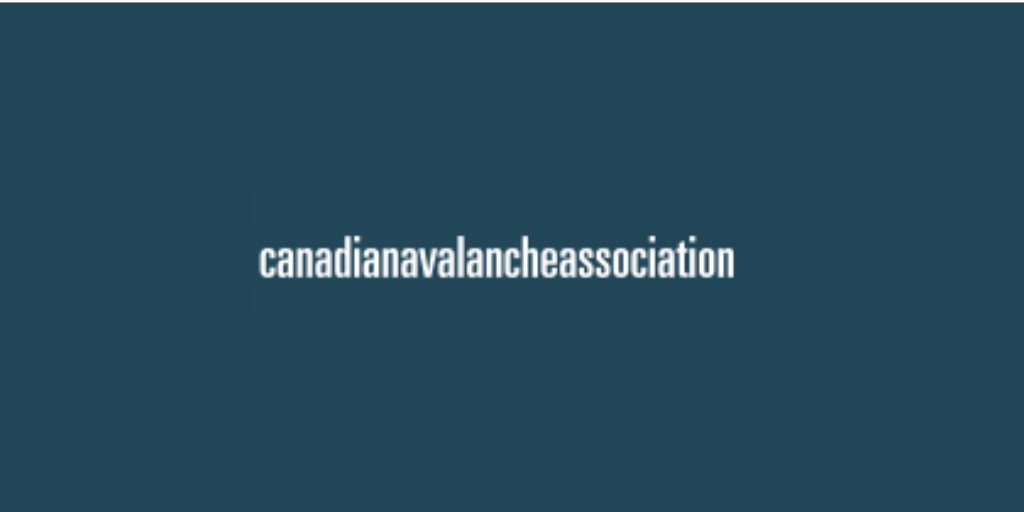At-a-Glance
- Customer's Business: The not-for-profit Canadian Avalanche Association ensures that its diverse membership of avalanche practitioners meets the highest standards, and adheres to best practices to secure the confidence of governments, industry and Canadians.
- Opportunity: To enable students to learn many of the basic concepts and theories as they pertain to snow and avalanches before the field-based portion of their studies, so that they can maximize application of that knowledge in the field.
- Solution: Lambda Learn and Lambda Analytics
- Results: Reduce time strain on instructors, improve the quality of training, and enable students to be more prepared and armed with knowledge in advance of rigorous field training.
About the Canadian Avalanche Association
With operations based in the heart of avalanche country, Revelstoke, British Columbia, Canada, the vision of the Canadian Avalanche Association (CAA) is to instill the public with the highest degree of confidence in the avalanche safety programs and services delivered by its members. Every year adventurers flock to Revelstoke and its two National Parks (Mount Revelstoke and the Glacier)—which is spectacularly framed by the Monashee and Selkirk mountain ranges—to partake in any number of exhilarating activities including snowmobiling, helicopter, cat skiing and ski touring.
Being a member of the CAA requires knowledge of evolving avalanche-related sciences, specialized technical training, and extensive operational experience. CAA members serve the public by competently evaluating avalanche hazards and managing risks to protect people and property from avalanches. CAA members may work for ski resorts, industry and transportation (such as mining, highways or railway) or public avalanche safety organizations like Avalanche Canada. They may also be employed in helicopter, cat ski or snowmobile guiding operations or as avalanche consultants, instructors of professional or recreational avalanche courses, researchers and more.
The CAA’s Industry Training Program (ITP) offers training and continuing professional development courses for persons employed or seeking employment in activities where they are required to identify and/or actively manage avalanche hazards.
The Challenge
Up until now, the CAA’s professional avalanche training programs had been delivered in-person only. There are currently 11 different courses that the CAA delivers through its Industry Training Program. Many of these courses are delivered as a combination of classroom and field-based training.
This is the first time the association is embarking on offering online courses to supplement the training. Field courses are offered throughout British Columbia, Alberta, and Quebec and students live and work in many different mountainous regions in Canada. Being able to offer the prerequisite component of the training online, which covers fundamental concepts and theories, would enable students to have a consistent foundation of knowledge.
Stated Emily Grady, Industry Training Program Manager, “We hired a consultant to help us narrow the options and, based on their final report, we ended up choosing Lambda Solutions to provide the technical support. We didn’t have the IT capacity to update and host an LMS, and based on the interactions with the Lambda Solutions team throughout the entire evaluation process, all roads pointed to this solution.”
"The Lambda team has been very helpful in all aspects of the setup and training. They are readily available when we have questions and provide helpful answers. I wouldn’t hesitate to recommend Lambda based on our ongoing experience and their willingness to think creatively and to be readily available when we have questions." - Emily Grady, Industry Training Program Manager, Canadian Avalanche Association
The Solution
To begin with, the team, consisting of three subject matter experts/instructors, two administrators and one online learning curriculum specialist, are creating an online “pre” course for the Avalanche Operations Level 1 which is provided to over 325 students per winter.
After completing the online course, it will be tested with a select pilot group and the plan is to roll out the course to students in September 2019. The intent of the online portion of the course is to enable the students to learn many of the basic concepts and theories as they pertain to snow and avalanches ahead of the field-based portion. In this way, students will be well prepared, attain a strong foundation of knowledge, and be able to maximize application of that knowledge in the field.
Continued Grady, “As we continue to test drive this course and the LMS, our long-term goal is to transfer many of the pre-course preparation materials from our other courses to the online learning platform.”

The Results
1. Reduce Time Strain
The Avalanche Operations Level 1 (7-day) course has been delivered primarily in the field, and also includes many classroom presentations. By delivering some of the information online, students will have common knowledge before arriving for their field-based training—easing the time burden that is currently being experienced. This enables instructors to maximize application of the concepts that students learned online in the field.
2. Increase Preparedness & Knowledge
The CAA is also anticipating that the level of preparedness and knowledge that its incoming students have will be much higher as a result of completing the online course materials prior to attending the field-based course. By having this base, they will be able to spend more time actually applying that knowledge on the ground, rather than just theoretically learning about it in the classroom.
3. Increase Quality of Training
The quality of training and level of comprehension will be much higher in students using a blended learning approach, and therefore, will benefit the snow and avalanche industry as a whole.
4. Reporting and Analytics
“The analytics aspect of Lambda Analytics has appeal with the idea that we’ll be able to easily summarize and report on how students experience and move through our online courses,” stated Grady. Reports will be generated to provide assessments throughout the training to ensure the students are “getting it” and the CAA will use these analytics to ensure a consistent prerequisite baseline of knowledge is being met. Analytics will also pinpoint sections of the courses that may need to be modified based on student feedback, to ensure maximum effectiveness.
5. Training & Support
After going through the training that Lambda provided, the CAA team found it fairly straightforward to set up the site from an administrative perspective. “The Lambda team has been very helpful in all aspects of the setup and training. They are readily available when we have questions and provide helpful answers. I wouldn’t hesitate to recommend Lambda based on our ongoing experience and their willingness to think creatively and to be readily available when we have questions.”
"We have had an excellent experience with Lambda Solutions thus far and we’re excited to be embarking on our first venture into the land of online course delivery. The Lambda team thinks outside of the box to come up with creative and flexible solutions for us as we go through the process of setting up our courses. We look forward to having a successful launch." - Emily Grady, Industry Training Program Manager, Canadian Avalanche Association





